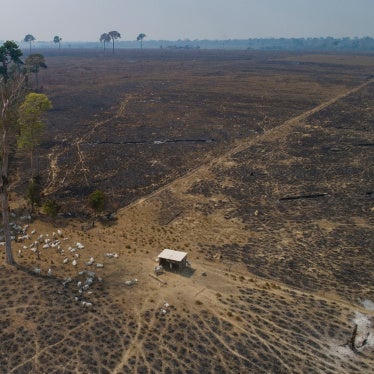Some of the images in this video, including the landscapes, were generated by AI technology.
(São Paulo) – Latin American countries meeting at the Amazon Summit in Brazil on August 8 and 9, 2023, should commit to ratify and carry out the Escazú Agreement, Human Rights Watch said today as it released a video explaining the importance of this treaty. The regional agreement would help shore up protection of the Amazon rainforest and other vital ecosystems across the region by requiring countries to protect environmental defenders, guarantee access to information, and ensure public participation in decision-making on environmental matters.
“The Amazon rainforest and its defenders are under serious threat,” said Juanita Goebertus, Americas director at Human Rights Watch. “Governments gathered for the Amazon Summit should show their commitment to preserving a crucial ecosystem for South America and the planet by ratifying and implementing the Escazú Agreement.”
Countries sharing the Amazon will meet in the city of Belém to advance the Amazon Cooperation Treaty Organization, an intergovernmental organization. Brazil, Venezuela, Bolivia, Peru, Ecuador, Colombia, Guyana, and Suriname, as well as the territory of French Guiana, are expected to send representatives. They plan to issue a joint commitment to act together to protect the forest and promote sustainable development in a region that is vital for fighting climate change.
Ratifying and implementing the Escazú Agreement should be a central part of governments’ commitment to protect the Amazon, Human Rights Watch said.
Three of the eight countries where the Amazon is located – Ecuador, Bolivia, and Guyana – are among the fifteen nations that have already ratified the Escazú agreement. In addition, Colombia’s Congress passed a law approving the agreement, which President Gustavo Petro signed. The Constitutional Court is reviewing the decision, a final step before the government ratifies the treaty. After 140 organizations including Human Rights Watch pressed Brazil for action, President Luis Inácio Lula da Silva sent the agreement to Congress in May.
The treaty, adopted in 2018 in Costa Rica, guarantees people’s right to obtain environmental information and to participate meaningfully in decision-making that affects their lives and environment. It requires countries to ensure access to justice when those rights are violated, and to establish systems to prevent environmental harm or provide redress. It is the world’s first legally binding instrument containing specific provisions on environmental defenders – requiring governments to provide safe and enabling conditions for the defenders and ensuring that those responsible for violence and intimidation against them are investigated and prosecuted.
Upholding the rights established in the Escazú agreement could contribute hugely to reversing the cycle of violence and environmental destruction in the Amazon, Human Rights Watch said.
Brazil, Bolivia, Peru, and Colombia are ranked among the countries worldwide suffering the greatest loss of primary forest – meaning, mature, undisturbed forest – according to the World Resources Institute’s Global Forest Watch. Brazil, which includes about 60 percent of the Amazon basin, has led in the destruction, accounting for more than 40 percent globally in 2022. If this pace continues, vast portions of the rainforest may dry out in the coming years, releasing billions of tons of stored carbon, changing rain patterns and water cycles across South America, and accelerating climate change planet-wide.
The destruction has driven serious rights violations, including encroachment on protected land and violence and intimidation against forest communities, many of them Indigenous, that play a crucial role in protecting the rainforest, Human Rights Watch said. Carrying out the Escazú treaty could help protect environmental and other defenders in a region where they face high levels of violence.
In Colombia, more than 230 Indigenous, Afro-descendant, and peasant leaders have been killed since 2020, the Human Rights Ombudsperson’s Office reported. The situation in Brazil is also dire, with 100 people killed in conflicts over the use of land and resources since 2020, according to the nonprofit Pastoral Land Commission, 78 of them in the Amazon region.
The levels of deforestation and killings of environmental and land defenders should prompt governments in Latin America to ratify the agreement and take tangible steps to carry it out, Human Rights Watch said.
Governments should actively foster public participation and access to information in environmental matters, even before they have ratified the agreement. They should establish or strengthen mechanisms to protect environmental defenders and ensure that any acts of violence against them are properly investigated and those responsible brought to justice.
“Latin America is the world’s most dangerous region for environmental and land rights defenders,” Goebertus said. “Better protection for front-line communities is key to keeping our forests standing – and keeping them standing is key to containing the climate crisis.”








